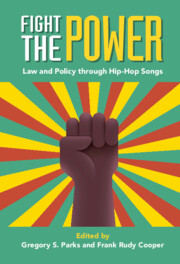Book contents
- Fight the Power
- Fight the Power
- Copyright page
- Dedication
- Contents
- Contributors
- Acknowledgments
- Introduction Still Fighting the Power
- Part I Policing
- 1 From “Fuck tha Police” to Defund the Police: A Polemic, with Elements of Pragmatism and Accommodation, Hopefully Not Fatal, As Black People Hope About Encounters with the Police
- 2 Hip-Hop and Traffic Stops
- 3 “Black Cop”: It’s a Blue Thing (or Is It?)
- 4 “Illegal Search”: Race, Personhood, and Policing
- 5 “Cops Shot the Kid”: Police Brutality, Mass Incarceration, and the Reasonableness Doctrine in Criminal Law
- Part II Imprisonment
- Part III Genders
- Part IV Protests
- Index
2 - Hip-Hop and Traffic Stops
from Part I - Policing
Published online by Cambridge University Press: 20 January 2022
- Fight the Power
- Fight the Power
- Copyright page
- Dedication
- Contents
- Contributors
- Acknowledgments
- Introduction Still Fighting the Power
- Part I Policing
- 1 From “Fuck tha Police” to Defund the Police: A Polemic, with Elements of Pragmatism and Accommodation, Hopefully Not Fatal, As Black People Hope About Encounters with the Police
- 2 Hip-Hop and Traffic Stops
- 3 “Black Cop”: It’s a Blue Thing (or Is It?)
- 4 “Illegal Search”: Race, Personhood, and Policing
- 5 “Cops Shot the Kid”: Police Brutality, Mass Incarceration, and the Reasonableness Doctrine in Criminal Law
- Part II Imprisonment
- Part III Genders
- Part IV Protests
- Index
Summary
Henry Chambers synthesizes analysis of Jay-Z’s 2003 song, “99 Problems”, as well as Chamilionaire’s 2005 “Ridin’” and 2007 “Hip Hop Police” as means of understanding police racial profiling. The songs analyzed in this chapter discuss policing black men. Though the songs are more than a decade old, they are just as relevant today as when they were released. They tell stories of interactions between police and black men, describe how such interactions do proceed, and suggest how they should proceed. The artists indirectly comment on freedom by discussing how police should treat someone they may not like or may envy but who the police have no basis to believe is engaged in criminal behavior. Indeed, the songs suggest police have an obligation to police properly even if the suspect may in fact be engaged in criminal behavior. However, the songs are somewhat surprising in that they seem to suggest black men will typically be hassled by police but that black men with resources may be able to fearlessly assert their rights to not be policed unfairly in some circumstances. The songs provide strong material to explore what policing should look like in the current age.
Keywords
- Type
- Chapter
- Information
- Fight the PowerLaw and Policy through Hip-Hop Songs, pp. 38 - 54Publisher: Cambridge University PressPrint publication year: 2022



